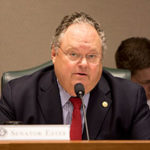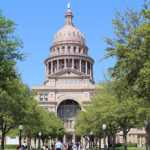Posted: 5/30/03
Broad coalition supporting workplace freedom bill
By Kevin Eckstrom
Religion News Service
WASHINGTON–An unusually broad coalition of religious groups is pushing a bill that would protect religious expression in the workplace. But civil liberties groups are concerned the bill could be used to advance on-the-job proselytizing.
The Workplace Religious Freedom Act, introduced by Sens. Rick Santorum, R-Pa., and John Kerry, D-Mass., would force employers to “reasonably accommodate” employees who want to wear religious articles or take time off for worship services.
Current law mandates that employers allow such expression as long as it does not impose an “undue hardship” on the company. Supporters, however, say a 1977 Supreme Court ruling gutted the law and has not protected employees' rights.
“America is distinguished internationally as a land of religious freedom,” Santorum said in introducing the bill. “It should be a place where people should not be forced to choose between keeping their faith and keeping their job.”
The American Jewish Committee, one of the bill's primary backers, point to cases like Amric Singh Rathour, who was fired as a New York City traffic cop when he refused to shave his religiously mandated beard or remove his turban. Rathour's suit against the city, filed in March, is pending.
The AJC also defended a New York Rastafarian who was fired from his job at FedEx when he refused to cut his dreadlocks, a part-time Methodist minister who was fired from a furniture store for taking time off to conduct a funeral, and a Muslim woman who was fired from Alamo Rent-A-Car for insisting that she wear a headscarf.
Religious groups, including Seventh-day Adventists, Muslims, Southern Baptists, the National Council of Churches and others, say religious minorities are especially vulnerable to discrimination.
“We need a stronger position so that employers are not denying what is reasonable,” said Clarence Hodges, director of public affairs and religious liberty for the General Conference of Seventh-day Adventists, who take Saturday as their Sabbath. “They need to understand that 'reasonable' means reasonable, and that you can do what you need to do without upsetting everything and everybody.”
The employer mandate was inserted into Title VII of the federal Civil Rights Act in 1972. Five years later, however, the Supreme Court ruled that even a minimal hardship on employers was not covered under the act.
The new bill would define “undue hardship” as something that imposes “significant difficulty or expense” on the employer or that would keep an employee from carrying out the “essential functions” of the job. The law does not apply to businesses with fewer than 15 employees.
Business lobbyists have stalled attempts to advance the bill for almost a decade. And the American Civil Liberties Union, which has defended the rights of religious employees in so-called “appearance and scheduling” cases, said the current bill is too broad.
Christopher Anders, the ACLU's legislative counsel, said the new law would sanction activities by employees that have not been allowed under current law, such as a Catholic Chicago police officer who refused to guard an abortion clinic, or a state nurse in Connecticut who, while visiting the home of a gay AIDS patient, condemned the man's lifestyle and told him to repent.
Anders said there are no protections in the bill to prohibit an employee from forcing religious beliefs on other workers or from allowing a worker to dictate his or her duties because of religious or moral convictions.
Nathan Diament, Washington director for the Union of Orthodox Jewish Congregations of America, dismissed such “slippery slope” predictions.
“You can turn anything into a law school hypothetical, but we feel that this bill does not obviously allow for those kinds of things,” Diament said.
The bill, S. 893, is awaiting action in the Senate Committee on Health, Education, Labor and Pensions.














We seek to connect God’s story and God’s people around the world. To learn more about God’s story, click here.
Send comments and feedback to Eric Black, our editor. For comments to be published, please specify “letter to the editor.” Maximum length for publication is 300 words.